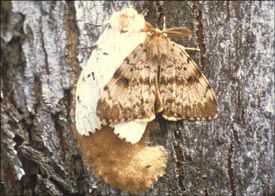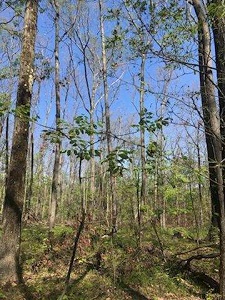Many invasive species active within our communities today were introduced to the region decades ago through commercial ventures designed to improve or change some aspect of particular industry. In the late 1860s, U.S. silk producers, believing they could produce a silkworm that could withstand the harsh New England climate, brought a native of France to Massachusetts. As with so many such well-intentioned adventures, the silkworm cross breeding exercise produce little in the way of commercial success but it did leave behind some very productive foragers — Gypsy moths (Lymantria dispar dispar). And where the silk production failed, moth production flourished. Escaped Gypsy moths have since expanded from their New England captors to the far reaches of the Carolinas, and as far west as the foothills of the northern U.S Rockies.
While most Gypsy moths, and their early-stage larvae and caterpillars, are normally held naturally in check by birds and rodents, every 10 to 15 years “outbreaks” can occur when populations out-pace consumption resulting in highly destructive leaf-munching hordes. According to the NY DEC, “Gypsy moth caterpillars eat young, tender leaves in the spring. Deciduous trees (trees that lose their leaves each fall) can regrow a new set of leaves by July and can usually withstand 2-3 successive years of defoliation (removal of leaves) without being killed. However, defoliation does reduce the vigor and resistance of the tree, and it becomes more susceptible to pests and diseases.”
“Tree death can occur when other stresses such as disease or other insect outbreaks attack trees in the same year. When populations of gypsy moths are very high, or when oak and other preferred trees are limited, they will even eat evergreen species including pine, spruce and hemlock. Evergreens do not regrow leaves as easily as deciduous trees and can die as a result of complete defoliation.”
This past summer, elevated populations of Gypsy Moth caterpillars have caused noticeable leaf damage across New York and Northwest Pennsylvania. If you have noticed damage to your woodlot, a possible infestation of Gypsy moths may be the cause. Forecon can provide landowners with Gypsy Moth surveying services that determine the possible damage that might be done if left untreated.
If your trees were defoliated or you feel you should have your woodlot inspected for possible damage, call Forecon at (716) 664-5602. We are here to help.









